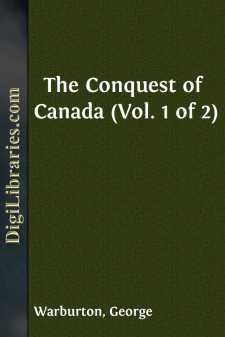Categories
- Antiques & Collectibles 13
- Architecture 36
- Art 48
- Bibles 22
- Biography & Autobiography 813
- Body, Mind & Spirit 142
- Business & Economics 28
- Children's Books 17
- Children's Fiction 14
- Computers 4
- Cooking 94
- Crafts & Hobbies 4
- Drama 346
- Education 46
- Family & Relationships 57
- Fiction 11829
- Games 19
- Gardening 17
- Health & Fitness 34
- History 1377
- House & Home 1
- Humor 147
- Juvenile Fiction 1873
- Juvenile Nonfiction 202
- Language Arts & Disciplines 88
- Law 16
- Literary Collections 686
- Literary Criticism 179
- Mathematics 13
- Medical 41
- Music 40
- Nature 179
- Non-Classifiable 1768
- Performing Arts 7
- Periodicals 1453
- Philosophy 64
- Photography 2
- Poetry 896
- Political Science 203
- Psychology 42
- Reference 154
- Religion 513
- Science 126
- Self-Help 84
- Social Science 81
- Sports & Recreation 34
- Study Aids 3
- Technology & Engineering 59
- Transportation 23
- Travel 463
- True Crime 29
The Conquest of Canada (Vol. 1 of 2)
by: George Warburton
Description:
Excerpt
INTRODUCTION.
England and France started in a fair race for the magnificent prize of supremacy in America. The advantages and difficulties of each were much alike, but the systems by which they improved those advantages and met those difficulties were essentially different. New France was colonized by a government, New England by a people. In Canada the men of intellect, influence, and wealth were only the agents of the mother country; they fulfilled, it is true, their colonial duties with zeal and ability, but they ever looked to France for honor and approbation, and longed for a return to her shores as their best reward. They were in the colony, but not of it. They strove vigorously to repel invasion, to improve agriculture, and to encourage commerce, for the sake of France, but not for Canada.
The mass of the population of New France were descended from settlers sent out within a short time after the first occupation of the country, and who were not selected for any peculiar qualifications. They were not led to emigrate from the spirit of adventure, disappointed ambition, or political discontent; by far the larger proportion left their native country under the pressure of extreme want or in blind obedience to the will of their superiors. They were then established in points best suited to the interests of France, not those best suited to their own. The physical condition of the humbler emigrant, however, became better than that of his countrymen in the Old World; the fertile soil repaid his labor with competence; independence fostered self-reliance, and the unchecked range of forest and prairie inspired him with thoughts of freedom. But all these elevating tendencies were fatally counteracted by the blighting influence of feudal organization. Restrictions, humiliating as well as injurious, pressed upon the person and property of the Canadian. Every avenue to wealth and influence was closed to him and thrown open to the children of Old France. He saw whole tracts of the magnificent country lavished upon the favorites and military followers of the court, and, through corrupt or capricious influences, the privilege of exclusive trade granted for the aggrandizement of strangers at his expense.
France founded a state in Canada. She established a feudal and ecclesiastical frame-work for the young nation, and into that Procrustean bed the growth of population and the proportions of society were forced. The state fixed governments at Montreal, Three Rivers, and Quebec; there towns arose. She divided the rich banks of the St. Lawrence and of the Richelieu into seigneuries; there population spread. She placed posts on the lakes and rivers of the Far West; there the fur-traders congregated. She divided the land into dioceses and parishes, and appointed bishops and curates; a portion of all produce of the soil was exacted for their support. She sent out the people at her own cost, and acknowledged no shadow of popular rights. She organized the inhabitants by an unsparing conscription, and placed over them officers either from the Old Country or from the favored class of seigneurs....


